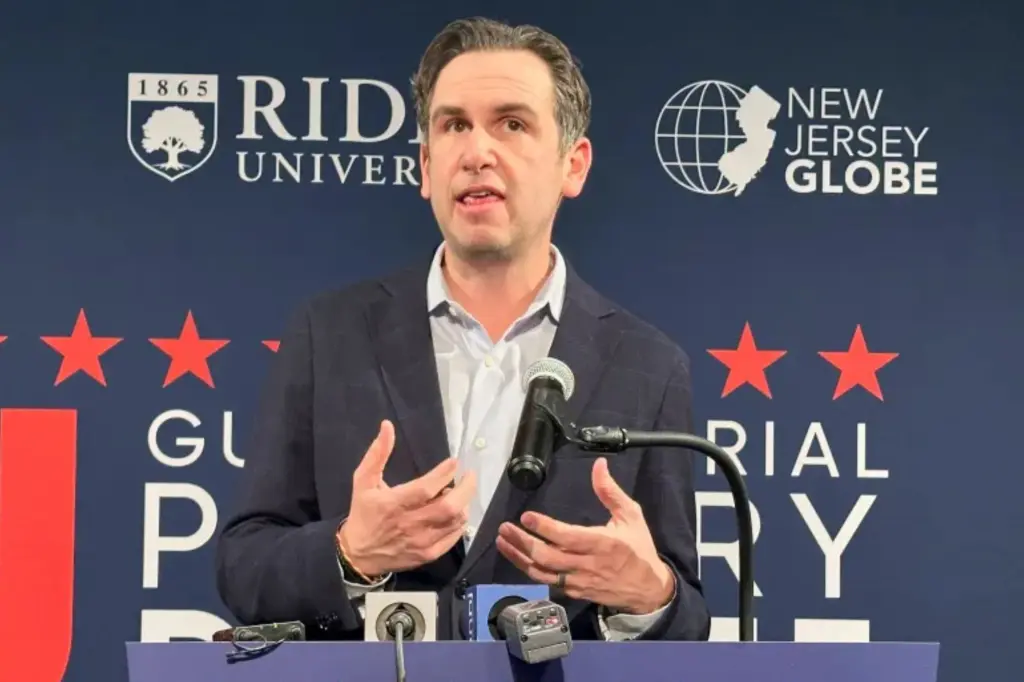Jersey City Mayor Eyes Top Role at NYC Business Partnership
Jersey City Mayor Steve Fulop has emerged as a leading candidate to become the next CEO of the Partnership for The City of New York, one of the most influential business groups in the Big Apple. The 48-year-old Democratic mayor, who would replace retiring CEO Kathryn Wylde, brings a unique background that includes Wall Street experience, military service, and over a decade of public leadership. While Fulop previously stated he had no desire to live in New York City, the position—which paid Wylde over $1.5 million in 2023—would require him to cross the Hudson River permanently if selected. This potential appointment comes after Fulop’s unsuccessful bid for New Jersey governor earlier this year, where he placed third in the Democratic primary with just 16% of the vote.
Fulop’s career trajectory reflects a commitment to public service that began dramatically after the September 11, 2001 terrorist attacks. Working at Goldman Sachs in lower Manhattan, he witnessed the first plane strike the Twin Towers, an experience that prompted him to join the Marine Corps just weeks later. He deployed to Iraq in 2003 as part of the 6th Engineer Support Battalion and completed his service with the rank of corporal. This military background, combined with his financial expertise from Goldman Sachs and education from SUNY Binghamton and Oxford University, has shaped his approach to governance. Fulop’s personal story also has deep roots in resilience—he was born to Romanian Jewish immigrants, with his mother being the daughter of Holocaust survivors. This diverse background has informed his leadership style as he navigated the challenges of governing New Jersey’s second-largest city.
As Jersey City’s three-term mayor, Fulop has built a reputation as a pragmatic progressive, championing housing development, job creation, and maintaining relatively low crime and property taxes. His administration has been credited with making Jersey City a leader in the Garden State for economic development while also supporting liberal workforce policies such as paid family leave and minimum wage increases. This track record of balancing business-friendly policies with progressive social initiatives may explain why he’s being considered to lead an organization representing 300 of New York City’s largest corporations, banks, real estate firms, and technology companies. The Partnership for NYC describes itself as dedicated to “advancing the city’s standing as a global center of economic opportunity, upward mobility, and innovation.”
Interestingly, Fulop recently defended NYC mayoral frontrunner Zohran Mamdani’s controversial proposal for government-run grocery stores, a position that might raise eyebrows among some Partnership members—including John Catsimatidis, whose Red Apple Group owns Gristedes grocery stores. In June, Fulop argued on social media that public grocery stores aren’t a radical concept, noting that “The USDA, under both Republican and Democratic administrations, has a track record of funding publicly supported grocery stores, including co-ops and nonprofit retail models.” He shared Jersey City’s own experiment with a “Healthy Corner Store” program designed to increase access to nutritional food in underserved communities, acknowledging that while “it didn’t work as well as I had hoped,” he was “still glad we tried.” This willingness to support innovative approaches to urban challenges while learning from both successes and failures could be valuable in representing New York’s diverse business interests.
During his gubernatorial campaign, Fulop demonstrated a willingness to stand up for New Jersey residents against New York policies he viewed as unfair, particularly objecting to the MTA’s congestion pricing for Jersey drivers entering Manhattan. He even suggested that New Jersey could implement its own fees for New Yorkers entering the Garden State to fund public transit. This regional rivalry stance raises questions about how effectively he might transition to advocating for New York City’s interests if appointed to lead the Partnership. Nevertheless, his extensive experience managing relationships between government and business sectors in a major metropolitan area adjacent to New York City provides him with valuable perspective on the region’s interconnected economy.
The potential selection of Fulop to lead this prestigious business organization reflects the increasingly complex relationship between progressive urban governance and traditional business interests. If appointed, Fulop would be stepping into a role that requires balancing the profit-driven concerns of Wall Street with the social responsibility demands increasingly expected of major corporations. His background spanning finance, military service, and public administration—combined with his experience governing a diverse city of 300,000 residents—provides him with a multifaceted perspective that could help bridge divides between various stakeholders. As New York City faces ongoing challenges related to post-pandemic recovery, affordable housing shortages, and maintaining its global competitiveness, the Partnership’s leadership selection will be closely watched by business leaders, politicians, and community advocates alike.







